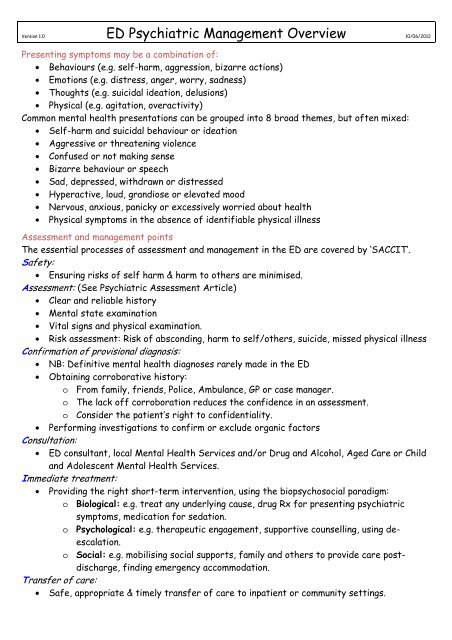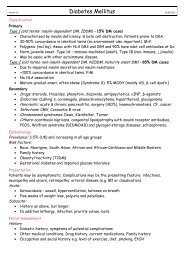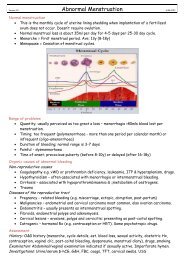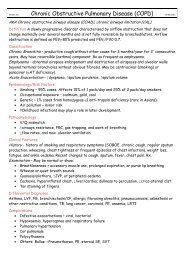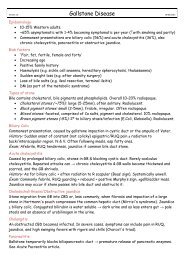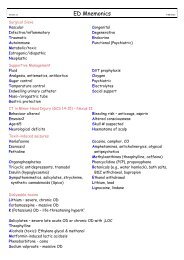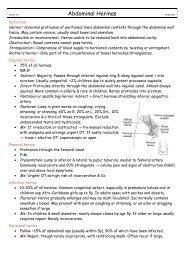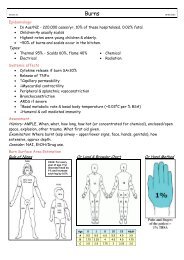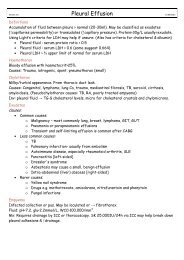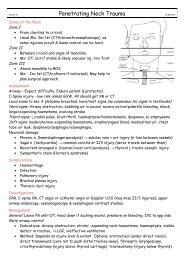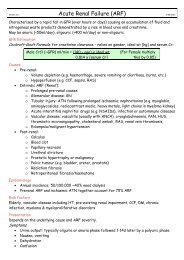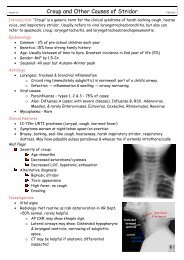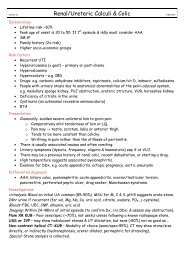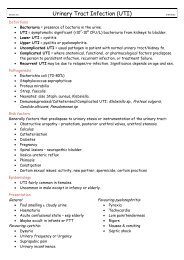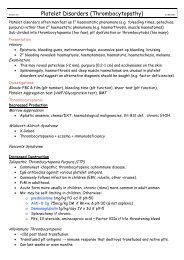ED Psychiatric Management Overview
ED Psychiatric Management Overview
ED Psychiatric Management Overview
- No tags were found...
Create successful ePaper yourself
Turn your PDF publications into a flip-book with our unique Google optimized e-Paper software.
Version 1.0 <strong>ED</strong> <strong>Psychiatric</strong> <strong>Management</strong> <strong>Overview</strong> 10/06/2012Presenting symptoms may be a combination of:• Behaviours (e.g. self-harm, aggression, bizarre actions)• Emotions (e.g. distress, anger, worry, sadness)• Thoughts (e.g. suicidal ideation, delusions)• Physical (e.g. agitation, overactivity)Common mental health presentations can be grouped into 8 broad themes, but often mixed:• Self-harm and suicidal behaviour or ideation• Aggressive or threatening violence• Confused or not making sense• Bizarre behaviour or speech• Sad, depressed, withdrawn or distressed• Hyperactive, loud, grandiose or elevated mood• Nervous, anxious, panicky or excessively worried about health• Physical symptoms in the absence of identifiable physical illnessAssessment and management pointsThe essential processes of assessment and management in the <strong>ED</strong> are covered by ‘SACCIT’.Safety:• Ensuring risks of self harm & harm to others are minimised.Assessment: (See <strong>Psychiatric</strong> Assessment Article)• Clear and reliable history• Mental state examination• Vital signs and physical examination.• Risk assessment: Risk of absconding, harm to self/others, suicide, missed physical illnessConfirmation of provisional diagnosis:• NB: Definitive mental health diagnoses rarely made in the <strong>ED</strong>• Obtaining corroborative history:o From family, friends, Police, Ambulance, GP or case manager.o The lack off corroboration reduces the confidence in an assessment.o Consider the patient’s right to confidentiality.• Performing investigations to confirm or exclude organic factorsConsultation:• <strong>ED</strong> consultant, local Mental Health Services and/or Drug and Alcohol, Aged Care or Childand Adolescent Mental Health Services.Immediate treatment:• Providing the right short-term intervention, using the biopsychosocial paradigm:o Biological: e.g. treat any underlying cause, drug Rx for presenting psychiatricsymptoms, medication for sedation.o Psychological: e.g. therapeutic engagement, supportive counselling, using deescalation.o Social: e.g. mobilising social supports, family and others to provide care postdischarge,finding emergency accommodation.Transfer of care:• Safe, appropriate & timely transfer of care to inpatient or community settings.
Relationship between mental health and physical disorder• Mental health symptoms may be due to underlying physical illness, a new mental illness orexacerbated pre-existing mental illness.• Mental illness may prevent the effective communication of physical symptoms.Mental Health Emergency PresentationsMajor risks include:• Patients at risk who abscond• Aggression• Self-harm/suicide• Mental illness not being recognised• Misdiagnosis or missing a physical cause for the problem• Severity of risk/s not being identified• Attempting to manage risks without the available resources, especially in rural <strong>ED</strong>s.Strategies to de-escalate the risk• A calm, courteous approach.• Keep patients and families informed of waiting times, delays and the reasons for these.• Listen and talk to the patient, explaining actions, and providing reassurance.• Anticipate the patient’s needs (e.g. analgesia, information, drink, food).• Reduce the stimulation from the environment if possible.• Involve trusted others (friends, family).• Where de-escalation failing or severe risk is imminent, use other aggression managementstrategies, include security staff, chemical/physical restraint, Police.Cultural considerations• Use health care interpreter service if NESB in preference to family members.• Cultural differences can influence symptomatology and help-seeking behaviour.• Religion and dietary considerations may also be relevant to a full assessment.• For indigenous patients consider involving Aboriginal Mental Health Workers, AboriginalHealth Service or the Aboriginal Medical Service.Duty of care• Does not overrule the autonomy of patient except in certain emergency situations wherethe failure to act would endanger the patient’s life or seriously injure their health.• A person can be treated without or against their consent if life-threatening emergency,urgent Rx is needed to prevent serious illness/injury, or in a mentally ill or mentallydisordered patient who requires treatment for their mental condition.• The Mental Health Act is NOT an instrument to be used to authorise non-psychiatricemergency medical or surgical treatment in the <strong>ED</strong>.Consultation with Mental Health ServicesGenerally patients who require mental health assessment/consultation are those with:• Suicide attempt/ideation• Psychosis• Self-harm• Patients who request mental health services• Agitation• Patients with complex or difficult mental• Mental health related aggressionhealth problems.• Severe distress• Confusion with behavioural disturbance• Severe depression• Sedation issues


